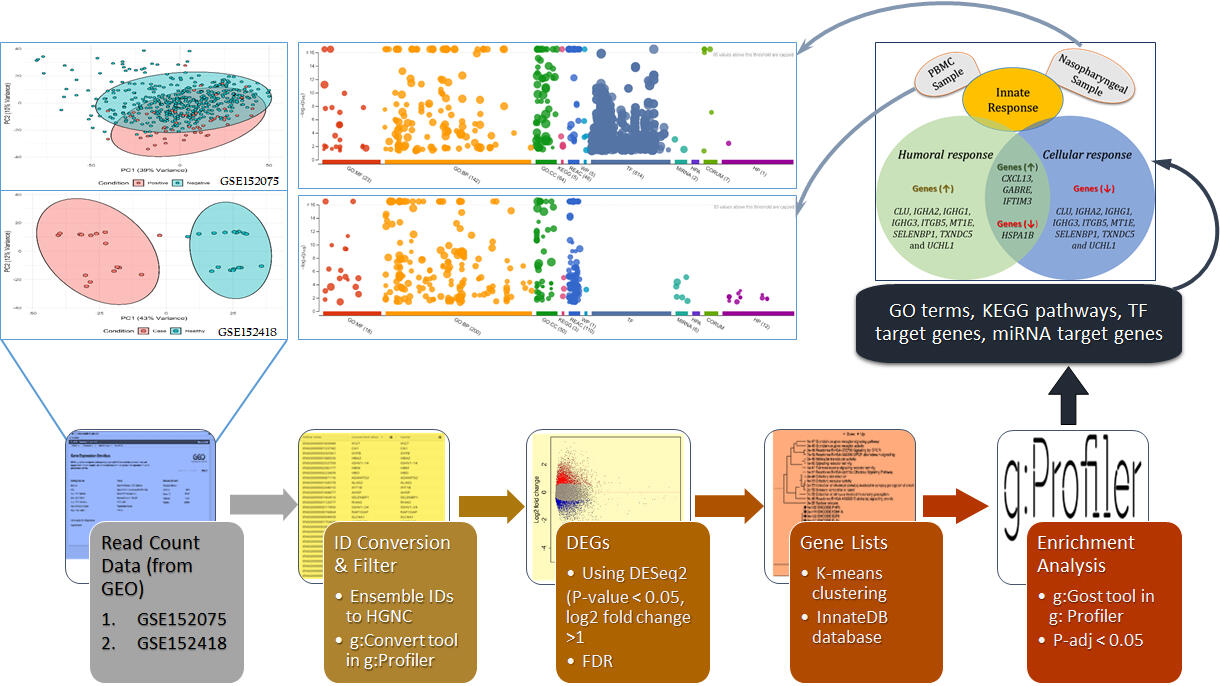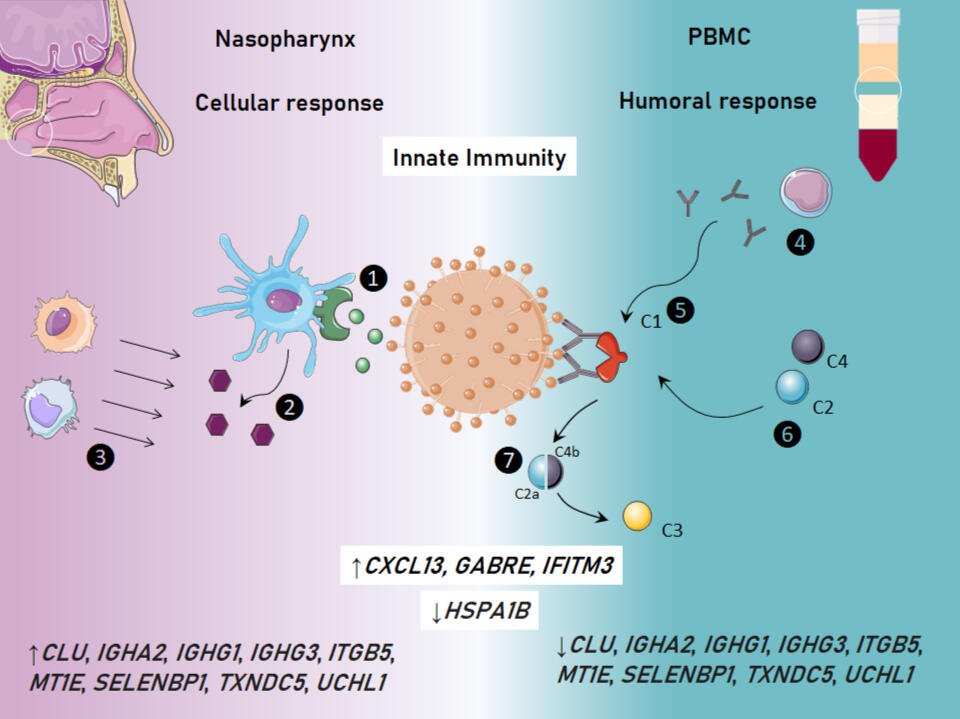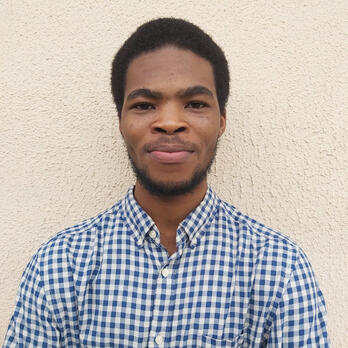
Team Genomics-Two
International Collaboration for Transcriptomic Analysis under the HackBio Internship Program

Figure: Schematic representation of the workflow in the present study
1. Why are we doing this project?
This work addresses transcriptomic signature associated with SARS COV2 infection between nasopharyngeal swab and PBMCs samples.
2. What are we actually doing?
We are trying to find out how human nasopharyngeal and PBMC cells reacted to the viral infection at the genomic level by analysing differential gene expression data.
3. How are we doing it?
We obtained Gene expression datasets for peripheral blood mononuclear cells (PBMCs) and nasopharyngeal swabs from GEO-NCBI, and these were subjected to differential gene expression analysis using DESeq2 package in R and enrichment analysis of differentially expressed genes between COVID-19 subjects and healthy controls.
4. What have we found out?
CXCL13, GABRE, IFITM3 were upregulated and HSPA1B was downregulated in COVID-19 subjects in both sample groups.
5. What does it mean?
These dysregulated genes could be further explored as potential biomarkers of COVID-19 infection.
Get to Know our research
Title:
Transcriptomic dysregulations associated with SARS-CoV-2 infection in human nasopharyngeal and peripheral blood mononuclear cell samples
Abstract:
Background: Over 24 million people have been infected globally with the novel coronavirus, SARS-CoV-2 with more than 820,000 succumbing to the resulting COVID-19 disease as at the end of August 2020. The complete molecular mechanisms underlying the pathogenesis of the disease are still unclear. We aim to understand host response to SARS-CoV-2 infection from two distinct sample types obtained from COVID-19 subjects and healthy controls.
Methods: We used two publicly available gene expression datasets generated by RNA sequencing of two distinct samples; peripheral blood mononuclear cells (PBMCs) and nasopharyngeal swabs. We performed a differential gene expression analysis between COVID-19 subjects and healthy controls in the two datasets and then functionally profiled the differentially expressed genes (DEGs). The DEGs common between both sample groups were assessed for their discriminatory utility. The genes involved in innate immunity were also determined.
Results: We found a clear difference in host response to SARS-CoV-2 infection between the two sample groups. In COVID-19 subjects in the PBMC group, host response involved an upregulation of genes involved in immunoglobulin mediated immune response and the complement system. In contrast, host response in COVID-19 subjects in the nasopharyngeal group, involved upregulation of genes involved in cytokine activity, interferon signaling pathway, as well as downregulation of genes involved in oxidative phosphorylation and viral transcription. Thirteen DEGs common between both sample groups accurately discriminated the samples.
Conclusion: Host response to SARS-CoV-2 varies in different human cells, suggesting the presence of biomarkers having diagnostic and prognostic utility in COVID-19 patients.
Proposed mechanism of the immune response against SARS-CoV-2 infection

Figure: Cellular and molecular alterations in SARS-CoV-2 infection in nasopharyngeal and PBMC samples. Proposed mechanism of the immune response against SARS-CoV-2 infection shows an innate immunity profile in nasopharyngeal and PBMC samples. Commonly expressed genes appear in upregulation of CXCL13, GABRE and IFITM3; and downregu;ation of HSPA1B for both nasopharyngeal and PBMC samples, downregulation of CLU, IGHA2, IGHG1, IGHG3, ITGB5, MT1E, SELENBP1, TXNDC5 and UCHL1 in nasopharyngeal sample and upregulation in PBMC sample. Nasopharyngeal sample reveals an inflammatory response cellular mediated against SARS-CoV-2 infection. Viral protein interaction between cytokine and cytokine receptor occurs (1) in antigen-presenting cells, producing cytokines/chemokines (2) and creating a signalling gradient to favour leukocyte migration (3) to the site of infection. PBMCs sample displays a humoral response, mediated by circulating immunoglobulin production by B cells (4) that promote antigen binding, activating the classical pathway of complement system cascade (5). Creation of C4 and C2 activators occurs (6) and cleavages into C2a and C4b (7) to initiate C3 and so on to complete the activation of the complement cascade.
Meet the Team

Maruf Ahmed Bhuiyan
Molecular Virologist
Dr. Maruf is a physician from Bangladesh. He's currently pursuing his Doctor of Medicine (MD) in Virology at the Bangabandhu Sheikh Mujib Medical University. He loves acquiring new skills and has a passion for research, programming and photography.
Email: [email protected]

Olayemi Rotimi
Biochemist (B. Sc.)
Olayemi is a Biochemist from Nigeria. He is aspiring to further his studies in the field of Molecuar Biology and Genetics. He is keen on self development and passionate about improving human health through research.
Email: [email protected]

Leonard Uzairue
Ph.D Candidate
Uzairue Leonard Ighodalo is Medical Laboratory Scientist and a PhD candidate in Medical Microbiology and Public Health at Department of Microbiology, College Bioscience, Federal University of Agriculture, Abeokuta, Ogun State Nigeria. He is passionate about Data science, Bioinformatics and Metagenomic. He loves research and coding
Email: [email protected]

Mujib Abisogun
M.Sc. Student of Cell Biology & Genetics at University of Lagos, Lagos Nigeria
Mujib is a fervent lover of biological sciences with special focus in genetics. A learning enthusiast and developing new passion for computational biology.
Email: [email protected]

Oluwapelumi Adejinmi
Medical student in the University of Ibadan, Nigeria
Oluwapelumi Adejinmi is a 3rd year medical student at University of Ibadan, Nigeria. He has keen interest in Medicine, Synthetic Biology, Mathematics, Astronomy and the Human brain.
Email: [email protected]

Ibironke, Monsurat Ademidun
Botanist
Monsurat is a graduate of Botany in Lagos State University, Lagos, Nigeria. She is passionate about Plant Breeding and Genetics. She loves to learn new things.
Email: [email protected]

Winfred Gatua
EANBiT MSC Fellow in Bioinformatics at Pwani University, Kenya
Winfred is passionate about improving human health through research. Her research interests are in Genomics, Toxin research, Machine learning and Open Science. She is a member of Black women in Computational Biology.
Email: [email protected]

Akadiri O. Olalekan
Research Officer
Olalekan is a research officer in Medical Microbiology and Public Health, currently work with the Federal Institute of Industrial Research Oshodi Nigeria. He is interested in anything science but have keen passion for Genomics and Biotechnology.
Email: [email protected]

Gracious Mwandira
Msc in Bioinformatics
Gracious is a postgraduate student at the University of Malawi, College of Medicine. He has research interests in cancer epigenetics and molecular epidemiology of cancer.
Email: [email protected]

Tiffany Ezinne George
B.Tech Holder
Tiffany is a Biotechnology graduate from Nigeria, passionate about exploring the field of Biopharmaceuticals and Genomics hence, currently working towards that. She has an unusual appetite for learning, has good team spirit and is very teachable. She loves research, playing video/board games and listening to good music .
Email: [email protected]

Emmanuel Olajide
Plant Pathologist
Emmanuel is currently a doctoral research student at Ghent University, Belgium and at the International Institute of Tropical Agriculture (IITA), Nigeria. He is passionate about genomics, he want to establish reliable molecular barcodes for plant-pathogen identification.
Email: [email protected]

Mahmood Usman
Neuroscience Researcher
He is currently a Ph.D. candidate in the field of neuroscience, with an emphasis on neuro-toxins. he is passionate about neuro-genomics and bioinformatics. Always fascinated about scientific discoveries and how they could positively impact on human life.
Email: [email protected]

Caroline Melo
Biologist, Post-doctoral researcher
Dr. Caroline is a Brazilian scientist in the field of life sciences. She has interest in immunology, systems biology and pathology in infectious diseases. Her main area of investigation is studying the biological pathways in the spleen during immune response against infection.
Email: [email protected]

Ifeoluwa Adewunmi
Undergraduate student of Human Physiology
Ifeoluwa is passionate about scientific research and contributing positively to her community, she is specifically interested in epigenomics.
Email: [email protected]

Karan Kumar
Youngest Prime Minister’s Research Fellow (PMRF) at Indian Institute of Technology (IIT) Guwahati (Assam, India)
Karan does research in Environmental Engineering and Biotechnology. His area of interest lies in applications of state-of-the-art techniques from molecular dynamic simulation, systems metabolic engineering, machine learning & artificial intelligence in biological systems.
Email: [email protected]

Priscilla Abechi
Doctpral fellow at the African Center for Excellence in Genomics of infectious disease(ACEGID)
Priscilla loves learning new things, has passion for research, public health, and organizing events. She loves reading and listening to music.
Email: [email protected]

Dina Aly Mahmoud Aly
Molecular Biologist
Dina Aly is a molecular biologist from Egypt. She's currently pursuing her master degree in Molecular physiology at Cairo Science University. She loves acquiring new skills and has a passion for research, programming and wildlife photography.
Email: [email protected]

Abdulazeez Giwa
Translational Bioinformatics
Abdulazeez uses computational methods in integrating multi-omic data to uncover the molecular mechanisms behind human diseases.
Email: [email protected]

Stephen Kanyerezi
Bioinformatics Intern
Stephen Kanyerezi is a Bioinformatics intern at the African Centre of Excellence, IDI, Makerere University. He's currently taking on a MSc in Bioinformatics at Makerere University. He's passionate at Genomics and programming and he has found purpose in coding
Email: [email protected]

Jabale Rahmat
MS student in Miami University of Ohio.
Jabale is curious about science and enthusiastic about doing research in the field of genetics and genomics. He is interested in Origin of life and evolution of living organisms.
Email: [email protected]

Abubakar Ridwanullah Abiodun
Physiologist
Ridwanullah is looking forward to commence his postgraduate Master's degree soon. He's passionate about biomedical research with high interest in molecular biology and bioinformatics
Email: [email protected]

Oyewumi Akinpelu
M.Sc
Oyewumi is an early career scientist from Nigeria. She is currently pursuing her MSc in Forensic Science at the University of Strathclyde, Glasgow. She is passionate about genetic/genomics research, especially its ability to provide valuable information for individual identification, population characterisation and precision medicine.
Email: [email protected]

Khatendra Reang
Biochemist
Khatendra Reang is a Biochemist from India, currently pursuing his Master in Biochemistry from Hislop College under Rastrasant Tukadoji Maharaj Nagpur University. He loves acquiring knowledge and has a passion in Genomics research, Computational Biology, Data Science and Music.
Email: [email protected]
Contact us for any query
